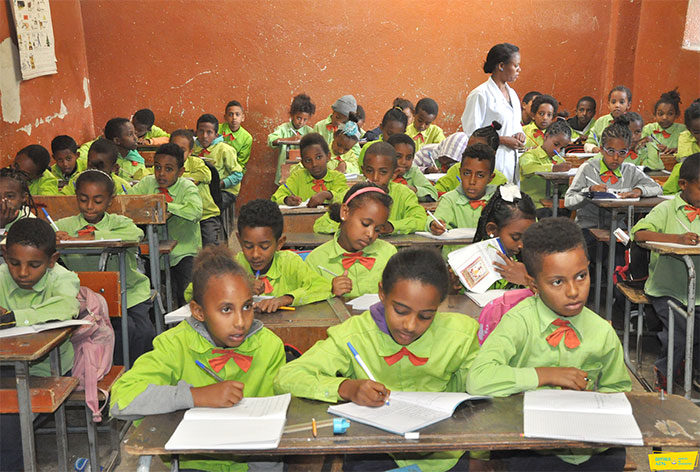
In the article ‘Development researcher: Time for a showdown with the myth of innocent development aid’ (original title in Danish: ’Udviklingsforsker: Tid til opgør med myten om den uskyldige ulandsbistand’ in Altinget on January 16, Annette Skovsted Hansen, spokesperson for the Danish Association of Development Researchers, is quoted as follows:
“There is an example from Eritrea, where Denmark insisted that the new schoolbooks had to be made in one language if Denmark was to pay for them, even though the local decision-makers wanted the school to be bilingual in primary school. I don’t think there is any reason to be proud of such a decision,” she says.
The quoted statement follows a section where the interviewer summarizes ASH’s position: “Also within education, she (ASK, ed.) believes that Denmark has had an errand in the development policy suitcase, albeit of a more ideological nature.
I don’t know where ASH got her Eritrea example, but I’m sure it was either a misunderstanding or the use of sources not on Eritrean soil. The example makes no sense.
Danish aid to education in Eritrea started in August 1996 and ended at the end of 2005. I had the pleasure of leading the Danish technical assistance to Eritrea’s Ministry of Education and its national institutions throughout the period.
As part of an ambitious inclusive education policy in a multi-ethnic society, Eritrea was the first country in the world to follow UNESCO’s recommendations that children should be taught in their mother tongue, at least in primary school, which at the time in Eritrea covered grades one to five.
There are nine languages rooted in as many ethnic groups in Eritrea, so curricula, books and other teaching materials had to be developed in nine languages. The Danish assistance included supporting the development of professional and institutional competencies and capacities to develop a primary school that could teach in nine different languages. (To avoid favoring one of the dominant languages, Eritrea decided at the time that the language of instruction after primary school should be English).
During the nine years of Danish aid, I held dozens of meetings with the Eritrean Minister of Education and his Permanent Secretary. I never encountered a desire for bilingual primary education, which would have conflicted with Eritrea’s constitution and official education policy. Nor am I aware of any Danish representative insisting on paying for books in only one language. If such a statement is to be found, it must be from someone who did not know the actual challenge.
Ideology in the suitcase of education
Of course, I cannot deny that there have been or are cases of Danish ideological thinking in Danish aid to education worldwide. But I can tell you that many of us have consciously fought such a tendency for many years if it were to emerge.
Danish aid to the education sector in Mongolia (June 1992) and Nepal (April 1996) followed Danish engagement in Eritrea. Danida contracted the then Danish School of Education, now DPU/Århus University, to coordinate technical and professional cooperation with the three countries’ ministries of education and their respective national institutions.
As head of all three initiatives, I can tell you that our first statement to our partners was: “We are not here to tell you how to develop your education sector. We are here to share knowledge, experience, and ideas. This is your country. You are the ones who decide. Hopefully, we have knowledge and experience that can be used. If not, send us back home.”
This mantra is the basis for the ongoing work of CICED, a Danish civil society organization (NGO).
Together with more than 300 other members of Civilsamfund i Udvikling/CISU, we focus on ‘shift the power’ and ‘locally led development’.
There are undoubtedly ideological errands in some suitcases within Danish development aid. As we have seen, confrontation with blind spots and power asymmetry is not new. There’s just more speed and more players, and civil society organizations are leading the way.


